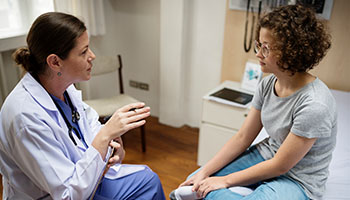HOW CAN WE HELP YOU? Call 1-800-TRY-CHOP
In This Section
Can Pediatrician Training Improve Human Papillomavirus Vaccination Rates?

Training physicians can improve HPV vaccination rates.
The findings:
Implementing a training program for clinicians about communication skills for human papillomavirus (HPV) vaccination during pediatric healthcare visits increased HPV vaccination, particularly vaccine initiation at well-child care visits.
Why it matters:
Some types of HPV can cause a variety of cancers, including cervical, oropharyngeal, anal, vulvar, vaginal, and penile cancers. Despite the availability of a safe and effective vaccine — which is recommended for adolescents age 13 to 17 years — only about half of this age group was up-to-date on the vaccine series in 2019. Previous studies have shown that when healthcare professionals recommend the vaccine along with other adolescent vaccines, the HPV vaccination uptake increases.
Who conducted the study:
The senior author of the paper is Alexander Fiks, MD, MSCE, director of the Clinical Futures, a CHOP Research Institute Center of Emphasis and professor of Pediatrics at the University of Pennsylvania Perelman School of Medicine. Other researchers from CHOP involved in the study include Robert Grundmeier, MD, director of clinical informatics in the Department of Biomedical and Health Informatics at CHOP; Mary Kate Kelly, MPH, clinical research coordinator at CHOP; and Chloe Hannan, MS, clinical research coordinator at CHOP. The first author was Peter Szilagyi, MD, MPH, of UCLA, and the project was a collaboration with the Pediatric Research in Office Settings (PROS) Network of the American Academy of Pediatrics, which Dr. Fiks leads.
How they did it:
The researchers conducted a longitudinal cluster randomized trial in which 48 primary care pediatric practices in 19 states throughout the U.S. were allocated to communication training vs. standard of care. Clinicians in the intervention practices underwent three sequential online educational modules that were developed to help physicians communicate with parents about the HPV vaccine. The physicians in the intervention practices also received weekly text messages to reinforce learning. The researchers evaluated missed opportunities for HPV vaccination at well-child care visits and at acute care and chronic care visits.
Quick thoughts:
“Improving HPV vaccination rates has been identified as one of the best opportunities currently available to prevent cancer,” Dr. Fiks said. “We found that a scalable communication skills intervention directed at pediatricians improves HPV vaccination for adolescents. If the intervention were scaled, clinicians around the U.S. and beyond could benefit from the communication strategies, reducing the morbidity and mortality from HPV-related cancers.”
Where the study was published:
The study appeared in JAMA Pediatrics.


